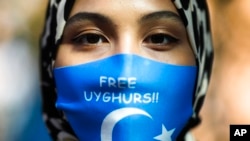Rights groups are urging Thailand not to send any of some 50 Uyghurs it has been holding captive for the past eight years back to China, fearing a repeat of 2015, when the government forcibly returned more than 100 Uyghurs to China.
Thailand is believed to be holding more than 50 Uyghurs in immigration detention centers across the country, most of them since at least 2014.
The United States and others have accused Beijing of genocide over its treatment of the predominantly Muslim minority group living in northwest China’s Xinjiang region, and urged countries that Uyghurs have fled to for safety not to force them back.
Beijing denies persecuting the group.
In Thailand, more than a dozen rights groups, led by the People’s Empowerment Foundation, handed the Foreign Affairs Committee of parliament’s lower house a petition on June 15 asking for its help to spare the detained Uyghurs a forced return.
“The first thing is to guarantee [the] safety of them in Thailand. They must be not sent back to China. That is the most important message that we send to the MPs,” foundation chair Chalida Tajaroensuk told VOA last week.
She said the groups were spurred to action after hearing from sympathetic but confidential sources within the Thai government late last year that Beijing may be stepping up its efforts to retrieve the Uyghurs.
Neither China’s Foreign Affairs Ministry in Beijing nor its embassy in Bangkok replied to VOA’s repeated requests for comment.
“Human Rights Watch has over the years documented overwhelming evidence showing serious abuses of ethnic Uyghurs by Chinese authorities, including arbitrary detention and forced disappearance, torture and other repression,” said Sunai Phasuk, senior Thailand researcher for the U.S.-based rights group, which also backs the petition.
“In effect, Chinese authorities have turned Xinjiang ... into a detention camp,” he said.
‘No clear assurance’
Like Chalida, Sunai fears a repeat of 2015, especially once China starts to lift COVID-linked entry restrictions.
“There has been no clear assurance that they will not repeat this again, so the danger [for] Uyghurs who remain in Thailand can be considered as still imminent,” he said.
Chalida said most of the Uyghurs being held in Thailand were among the hundreds arrested in 2014 for entering the country illegally, after fleeing China in hopes of settling safely elsewhere. Many Uyghurs aim for Turkey, where they claim kinship with the Turkic majority, other Muslim-majority countries, or the West.
Thailand deported 173 of the Uyghurs, mostly women and children, to Turkey in July 2015. A week later, it deported another 109, mostly men, back to China, setting off a wave of condemnation at home and abroad. In Turkey, irate locals stormed the Thai consulate, smashing windows and pulling down the Thai flag.
At the time, Thai authorities said 50 Uyghurs were still left in Thailand to have their country of citizenship verified. No Uyghur deportations have been reported since.
Neither Thailand’s Foreign Affairs Ministry nor the national police force’s Immigration Bureau, which runs the detention centers holding the Uyghurs, would tell VOA how many were in the centers now.
Chalida said her sources in the government and detention centers put the number at about 56.
Opposition lawmaker Rangsiman Rome, who accepted the July 15 petition as a member of the Foreign Affairs Committee, confirmed the figure. He told VOA it came to him from a government official who briefed the lower house’s Legal Affairs, Justice and Human Rights Committee, which he also serves on, a few months ago.
He said he would try to leverage his committee posts and seat in parliament to press the government on what, if any, plans it has to get the Uyghurs out of limbo, and to make sure it never sends them back to China.
“I strongly believe that if [the] Thai government sends them back to China, it’s like we send them to death,” he said.
‘Not humane’
Immigration Bureau spokesman Achayon Kraithong said the government had no plans to send them anywhere for now. Those decisions were up to other agencies, he added, mainly the National Security Council and the Ministry of Foreign Affairs.
The National Security Council did not reply to VOA’s requests for comment.
At the Ministry of Foreign Affairs, spokesman Tanee Sangrat said Thailand “will continue to take care of them until a practical and viable solution for the group can be found.”
He would not say whether Thailand had ruled out forcing them back to China, or why it hasn’t let them leave for other countries.
Panitan Wattanayagorn, who chairs Prime Minister Prayut Chan-ocha’s Security Advisory Committee, said Thailand was stuck between the competing wishes of the Uyghurs and China.
“Some of them [the Uyghurs] would like to go ... to different countries in Europe, to the United States. Some of them want to go to Turkey, to Indonesia and other [countries]. And China wants all of them to be returned. This is why this has stalled,” he told VOA.
Panitan said his team prepared a list of recommendations for solving the impasse about two years ago. He would not discuss the details.
“But in general, we recommended, based on [the] prime minister’s and deputy prime minister’s initiatives, to follow the international practices of repatriation [of] people to the destination without sending them to harm’s way,” he said, while weighing relevant laws, national security and “humanitarian issues.”
Until the government does decide where to send the Uyghurs, Chalida said it should at least let them out of the detention centers, where her sources tell her some are suffering both physical and mental health problems from the conditions. The Foreign Affairs Ministry says authorities are making regular improvements to the centers to care for mind and body alike.
Even so, Panitan, speaking only for himself, said Thailand should settle their fate as soon as possible.
“Personally, I think we should end this issue one way or the other,” he said, “This is not humane to treat these people this way.”






